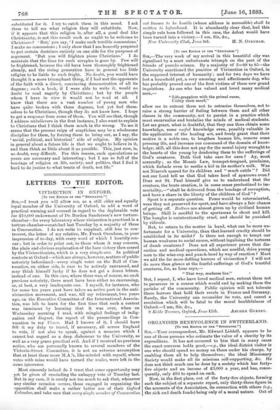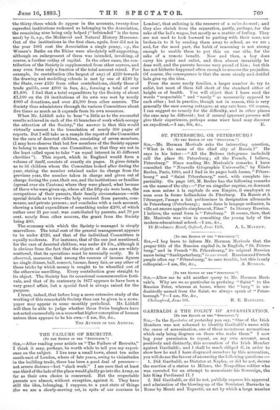ORGANISED BENEVOLENCE IN SWITZERLAND. [To THE EDITOR OP THE "SPECTATOR. "]
SIR,—Your correspondent, Mr. Edward Liddell, appears to be one of those persons who estimate the value of a charity by its expenditure. It has not occurred to him that in many cases the exact converse holds good,—e.g., the ideal district visitor is one who should spend no money on those under his charge, by enabling them all to help themselves ; the ideal •Missionary Society would make all its missions self-supporting, &c. He does not think much can be done by a society which has forty- five objects and an income of £3,000 a year, and has, conse- quently, only £66 to spend on each.
Now, in the first place, out of the forty-five objects, forming each the subject of a separate report, only thirty-three figure in the accounts of the Association, its connection with others (e.g., the sick and death funds) being only of a moral nature. Out of the thirty-three which do appear in the accounts, twenty-four represtnt institutions reckoned as belonging to the Association, the remaining nine being only helped (" befriended" is the term used) by it, e.g., the Mediaeval and Natural History Museums. Out of the institutions in the first class, again, four did not in the year 1881 cost the Association a single penny, e.g., the Women's Baths on the Rhine were absolutely self-supporting, although an enlargement of them was intended, involving, of course, a further outlay of capital. In the other cases, the con- tribution of the Society is supplemented from other sources, and may even form only a fraction of the total amount raised. For example, its contribution (the largest of any) of £220 towards the drawing and modelling schools is met by one of £240 by the State, over £120 from other contributions, chiefly those of trade guilds, over £800 in fees, &c., forming a total of over £1,400. I find that a total expenditure by the Society of about £1,100 on the 24 institutions of its own was met by nearly £960 of donations, and over £4,300 from other sources. The Society thus administers through its various Committees about five times as much as it expends from its own resources.
When Mr. Liddell asks to hear "a little as to the successful results achieved in each of the 45 branches of work which occupy the attention of the Society," the answer is that this would virtually amount to the translation of nearly 300 pages of reports. But I will take as a sample the report of the Committee for the care of deserted children, consisting of seven members, (I may here observe that but few members of the Society appear to belong to more than one Committee, so that they are not in the least called upon to take " an equal interest in 45 different charities "). This report, which in England would form a volume of itself, consists of exactly six pages. It gives details as to 56 children whom the Committee looked after during the year, stating the number retained under its charge from the previous year, the number taken in charge and given out of charge during the year, their sex, and the institutions or families (spread over six Cantons) where they were placed, what became of those who were given up, where all the fifty-six were born, the occupations qf their parents, their family circumstances—with -special details as to two—the help received from parents, com- munes, and private persons ; and concludes with a cash account, showing a total expenditure of something under £200, of which /rather over 21 per cent. was contributed by parents, and 79 per cent. nearly from other sources, the grant from the Society being £60.
The economy with which the Society is managed is simply marvellous. The total cost of the general management appears to be under 2120, and that of the individual Committees is equally moderate. For instance, that of the one just mentioned, for the care of deserted children, was under £4 10s., although it is obvious from the fact that the objects of its care are widely scattered, that its operations must be unusually costly. Be it observed, moreover, that among the sources of income figures no single dinner, ball, concert, bazaar, fancy fair, or any other of those tricks by which money is sought to be wheedled out of the otherwise unwilling. Every contribution goes straight to its object. The Society has its occasional commemoration festi- vals, and that of its centenary in 1877 appears to have been a very grand affair, but a special fund is always raised for the purpose.
I trust, indeed, that before long a more extensive study of the working of this remarkable Society than can be given in a news- paper may appear in some monthly periodical. Mr. Liddell will then be able to judge whether these Swiss burghers have not acted successfully on a somewhat higher conception of human nature than appears to be his own.—I am, Sir, &c.,
THE AUTHOR OF THE ARTICLE.



































 Previous page
Previous page